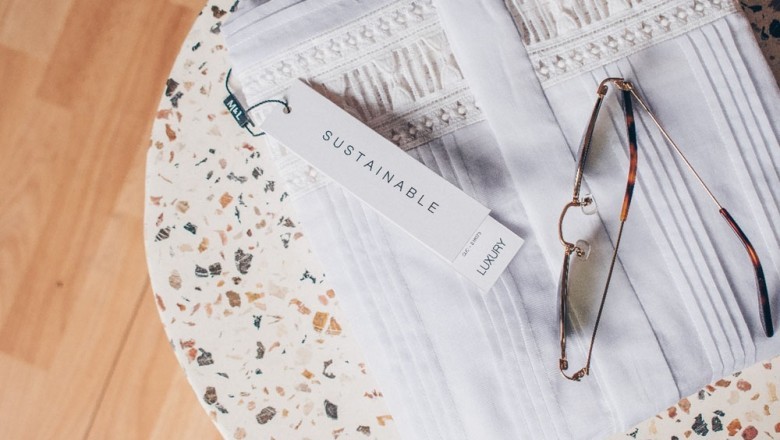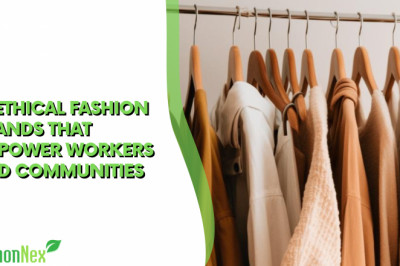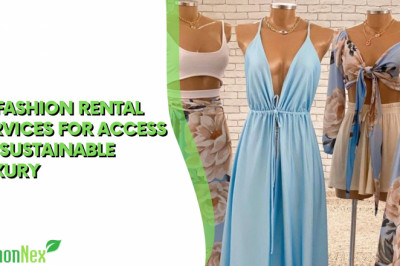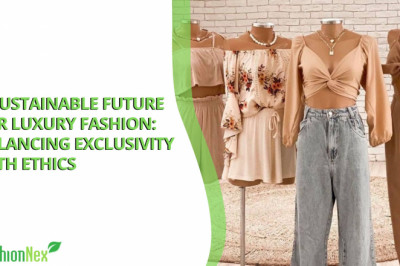views

In the intricate weave of global activism, where every strand seeks to mend the fraying fabric of our planet, fashion emerges as an unexpected yet potent thread. Long regarded as a realm of glitz and glamour, fashion is undergoing a profound transformation, aligning itself with the urgent call for environmental stewardship. This metamorphosis underscores a pivotal truth: fashion, with its far-reaching influence, can be a powerful force for change in the realm of environmental activism.
At the heart of fashion's evolving narrative lies a fundamental shift in consciousness. The industry, once synonymous with excess and waste, is now confronting its ecological footprint head-on. From design studios to factory floors, a growing number of fashion houses are embracing sustainability as a guiding principle. This shift encompasses every aspect of the fashion lifecycle, from sourcing raw materials to manufacturing processes and end-of-life disposal.
Central to this paradigm shift is the concept of eco-conscious design. Designers are increasingly turning to innovative materials and techniques that minimize environmental impact without compromising on style or quality. Recycled fibers, organic cotton, and cruelty-free alternatives are fast becoming the new standard, challenging traditional notions of luxury and exclusivity. Moreover, advancements in technology have paved the way for groundbreaking innovations such as lab-grown leather and biodegradable textiles, offering promising alternatives to resource-intensive materials.
Yet, the journey towards sustainability extends far beyond the design stage. Fashion brands are reimagining supply chains to prioritize transparency and ethical sourcing practices. By forging partnerships with local artisans and investing in fair trade initiatives, these brands are not only reducing their carbon footprint but also empowering communities around the world. Moreover, initiatives like the Fashion Pact, a coalition of leading fashion companies committed to environmental targets, are driving industry-wide collaboration towards shared sustainability goals.
However, perhaps the most transformative aspect of fashion's role in environmental activism lies in its power to influence consumer behavior. As custodians of culture and taste, fashion brands wield immense influence over consumer preferences and purchasing decisions. Recognizing this influence, a growing number of brands are leveraging their platforms to promote eco-conscious values and practices. From high-profile sustainability campaigns to eco-friendly product lines, these efforts are reshaping consumer perceptions of fashion as a vehicle for positive change.
Moreover, the rise of the slow fashion movement is challenging the prevailing culture of fast-paced consumption. By advocating for quality over quantity and encouraging mindful consumption habits, proponents of slow fashion are fostering a deeper connection between consumers and the garments they wear. This shift towards a more intentional approach to fashion not only reduces waste but also fosters a greater appreciation for the craftsmanship and artistry behind each garment.
In addition to reshaping consumer behavior, fashion is also catalyzing conversations around pressing environmental issues. Through initiatives like sustainable fashion weeks and eco-conscious runway shows, the industry is raising awareness about the environmental impact of fashion and advocating for systemic change. By spotlighting designers and brands that prioritize sustainability, these platforms are amplifying the voices of change-makers within the industry and inspiring others to follow suit.
Furthermore, fashion's role in environmental activism extends beyond the runway to the realm of policy and advocacy. Through lobbying efforts and public engagement campaigns, fashion industry leaders are pushing for regulatory reforms that promote sustainability and accountability. Whether advocating for stricter environmental standards or championing initiatives to combat textile waste, these efforts are shaping the broader landscape of environmental policy and governance.
Yet, for all its progress, fashion's journey towards sustainability is far from complete. Challenges such as supply chain transparency, labor rights, and circularity remain formidable obstacles on the path to a more sustainable future. Moreover, the pervasive culture of consumerism continues to exert pressure on both brands and consumers alike, perpetuating a cycle of overproduction and overconsumption.
Nevertheless, the growing momentum behind fashion's embrace of sustainability offers hope for a more equitable and environmentally conscious future. By harnessing its influence as a cultural force and embracing innovation as a catalyst for change, the fashion industry has the potential to weave a brighter, more sustainable tomorrow. As consumers, activists, and industry stakeholders alike continue to demand accountability and transparency, fashion stands poised to play a pivotal role in the global fight against climate change and environmental degradation.
In the tapestry of environmental activism, fashion emerges not as an isolated thread but as an integral strand woven into the fabric of change. Through its embrace of sustainability, advocacy, and innovation, fashion is transcending its traditional boundaries to become a driving force for positive transformation. As we chart a course towards a more sustainable future, let us recognize the transformative power of fashion as we thread together the fabric of change.











Comments
0 comment